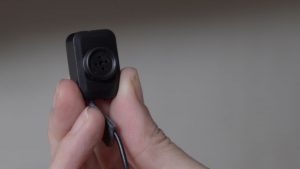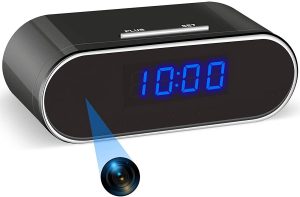Videocameras are everywhere today. They have become a normal, integral part of our lives. Many of us carry a videocamera with us everyday, everywhere we go, on the cellphone we carry with us. We have “apps” on those cell phones that have as their soul purpose the easy viewing and sharing of videos. We can text videos to one another. It seems to be our instinct now that when we see something interesting, we immediately pull out our cell phone and start videotaping. Some people have made a lot of money selling those videotapes to advertisement companies to use in commercials. If you just “Google” “rat dragging pizza” you will find one such video that became so popular the person who filmed the video of the rat dragging the pizza sold the video and made alot of money from it. There is no question that many instances of police brutality and excessive force would never have even come to light if it were not for a videotape of it. The murder of Ahmaud Arbery is one such case. Ahmaud’s killers may very well have gotten away with their crime without any accountability in the criminal justice system had there been no video of the shooting. Many states are now making it mandatory that all officers wear “bodycams” that record an arrest or interaction with a citizen. In our prisons, correctional officers wear bodycams and even have numerous “use of force” cameras stashed away throughout a prison floor that the officers can quickly grab to film any interaction with an inmate. Some of us wear “Go Pros” on our bodies while we are engaging in some activity we believe is particularly athletic, so we can brag to our friends later “Look what I did!” Many of us have Ring videocameras on our front doors so we can see who is at our door when the doorbell rings or see when a package has been delivered. I even have a client who used a Ring videocamera in their daughter’s bedroom to record her nocturnal seizures. We have babycams that capture what infants do in their cribs when they are really supposed to be sleeping. Videocameras are in our elevators, in our parking garages and in our convenience stores. We have a “Furbo” which is a dog videocamera that records when our dog is barking or moving around or just sleeping. It even allows us to throw him a treat remotely from my cellphone from wherever I may be. I have to admit that “Furbo” still blows me away.
So it comes as no surprise that families who have loved ones living in nursing homes or long-term care homes would think it a good idea to place a camera in the room of their loved one to keep an eye on him or her while the family can not be there in person. Many families are, sometimes, rightfully worried that their loved one may be experiencing abuse at the hands of some of the employees of the nursing home. We are all familiar with cases where that has happened. Last year in a highly publicized case in Cobb County, Georgia an employee of an assisted living facility was tried for murder for the death of a 91 year old resident who died in 2017. The employee was found guilty of elder abuse but not of murder.
This begs the question: Is it legal to place a camera in your loved one’s room in an assisted care facility? Maybe you are thinking only a lawyer would even think about that. It seems so clear and obvious that yes, of course, you can place a camera in your loved one’s room. That’s the smart and loving thing to do. Who would possibly question that?
Interestingly, the legality of that was not settled in Georgia until December 2020 with the criminal case Nuckles v. State, No. S20G0492 (Ga.Sup.Ct. December 21, 2020). In this case, Ms. Nuckles was charged with depriving an elder resident of an rehabilitation center of essential services and concealing the resident’s death. Prior to her trial on those charges, Nuckles filed a motion seeking to exclude a video recording captured on a camera concealed in Mr. Dempsey’s room at the residential rehabilitation center where Nuckles worked, asserting that the recording was inadmissible under OCGA § 16-11-67 because she did not consent to its recording as required under OCGA § 16-11-62 (2). The resident, Mr. Dempsey, had complained to his son, Timothy, about the care he was receiving, reporting that staff members were sometimes rude to him and that they would not answer his calls for assistance in a timely fashion. Dempsey asked Timothy to spend the night with him, but Timothy was unable to do so because he had to care for his stepchildren at night while his wife worked. Instead, Timothy decided to install a video surveillance camera in order to see what was going on in Dempsey’s room at night, and he found a camera online that was concealed in a four- to five-inch-square alarm clock and that would record “24/7” in five-minute increments onto a memory card. Timothy installed the camera on February 7 or 8, 2014, placing it on the dresser across from Dempsey’s bed where it was focused on Dempsey and his belongings. It did not capture Dempsey’s roommate’s side of the room, and the roommate only appeared on camera when he came over to Dempsey’s area. Timothy testified that Dempsey was happy with the camera because he felt like someone was watching what was going on. Only Timothy, Dempsey, the private caretaker hired by Timothy to watch his father during the day, Timothy’s wife, and Timothy’s stepdaughter knew the camera was there.
Dempsey passed away on February 27, 2014, and by that time, the camera had recorded approximately 400 hours of video. Before viewing the video from the night of Dempsey’s death, Timothy contacted law enforcement and requested that an autopsy be performed because Timothy had visited Dempsey the night before his death, thought Dempsey had been doing well, and found his death to be unexpected. Later, after Timothy viewed the video from the camera in Dempsey’s room, he forwarded it to law enforcement. Nuckles was subsequently indicted by a grand jury and charged with one count of depriving an elder person of essential services and one count of concealing the death of another. She later filed a “Motion to Suppress/Motion in Limine” seeking to exclude the video recording taken in Dempsey’s room, asserting that, because she did not consent to the video recording, it was made in violation of OCGA § 16-11-62 (2). That subsection provides that it is unlawful for
[a]ny person, through the use of any device, without the consent of all persons observed, to observe, photograph, or record the activities of another which occur in any private place and out of public view[.]
[f]or an owner or occupier of real property to use for security purposes, crime prevention, or crime detection any device to observe, photograph, or record the activities of persons who are on the property or an approach thereto in areas where there is no reasonable expectation of privacy[.]
Robin Frazer Clark is a trial lawyer who pursues justice for those who have personal injury claims as a result of being injured in motor vehicle wrecks, trucking wrecks, defective products, defective maintenance of roads, premises safety, medical malpractice and other incidents caused by the negligence of others. Ms. Clark is the 50th President of the State Bar of Georgia, a Past President of Georgia Trial Lawyers Association, a Past President of the Lawyers Club of Atlanta and has practiced law in Georgia for 30 years. She is a member of the International Society of Barristers and of the American Board of Trial Advocates. Mrs. Clark is listed as one of the Top 50 Women Trial Lawyers in Georgia and is a Georgia Super Lawyer. Ms. Clark is the co-host of the podcast “See You In Court,” sponsored by the Georgia Civil Justice Foundation.
Robin Frazer Clark ~ Dedicated to the Constitution’s Promise of Justice for All.
 Atlanta Injury Lawyer Blog
Atlanta Injury Lawyer Blog














